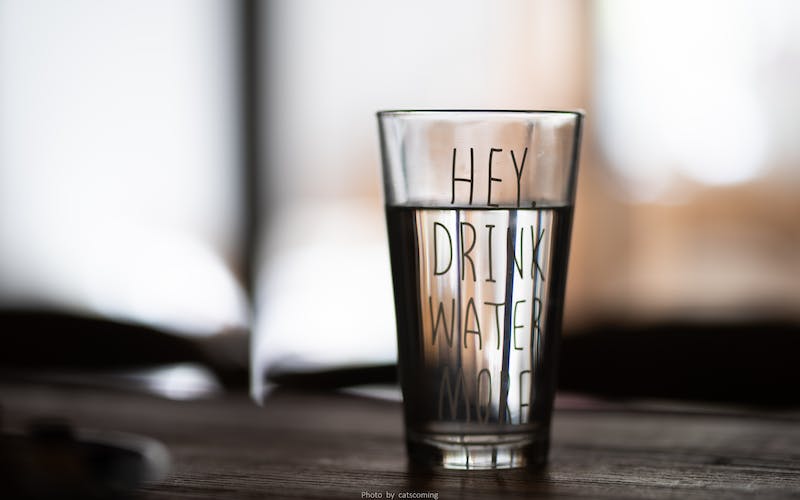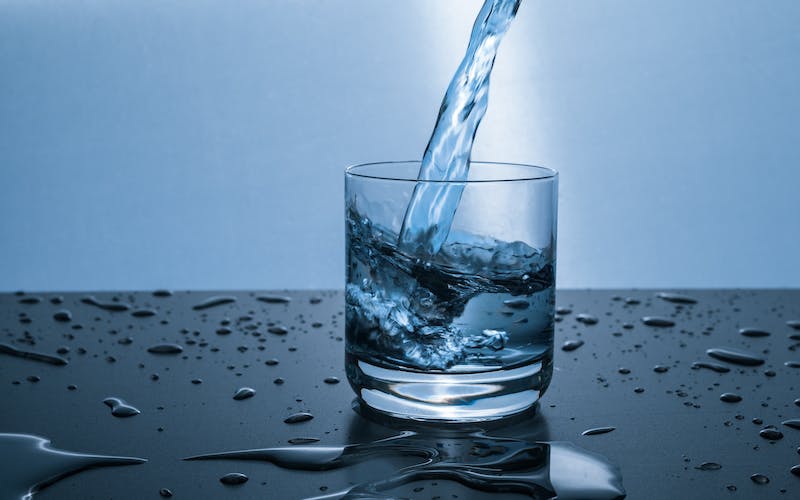
INTRODUCTION
Water is the essence of life. It’s a simple, undeniable fact that underscores the importance of hydration in our daily lives. But when it comes to the question, “How much water should you drink each day?” the answer is not as straightforward as we might think. This guide delves deep into the world of hydration, offering insights and evidence-based information to help you understand your body’s water needs.
In our journey to uncover the truth about hydration, we’ll explore various aspects of water consumption, from the health benefits of staying adequately hydrated to the risks associated with overhydration. We aim to provide a comprehensive, easy-to-read guide that not only answers the fundamental question of how much water you should drink but also empowers you with the knowledge to make informed decisions about your hydration habits.
Did You Know? The human body is composed of about 50% to 70% water, making it the most crucial component for our physiological functions.
UNDERSTANDING YOUR BODY’S WATER NEEDS
Water is not just a beverage; it’s a vital nutrient, playing an indispensable role in every aspect of our physiology. To truly grasp how much water you should drink, it’s essential to understand why your body needs water and how it uses it.

The Role of Water in the Body
- Cellular Function: Every cell in your body requires water to function correctly. Water participates in the biochemical breakdown of what we eat, helps transport nutrients, and is involved in maintaining cell structure.
- Thermoregulation: Water aids in regulating your body’s temperature. Through sweat, water evaporates from your skin’s surface, cooling your body down.
- Joint Lubrication: It acts as a lubricant in your joints, reducing friction and protecting them during movement.
- Detoxification: Water is crucial for flushing out waste products from your body, primarily through urination and sweat.
Individual Water Needs
Your water requirement is as unique as you are. Several factors influence it:
- Age and Gender: Generally, adults need more water than children, and men typically require more than women.
- Body Weight and Composition: More body mass means a greater need for water.
- Activity Level: Active individuals lose more water through sweat and hence need more to replenish.
- Diet: Certain foods, especially those high in sodium, can increase your water requirement.
- Health Conditions: Some health issues and medications can either increase or decrease your water needs.
- Climate: Living in hot, humid, or dry areas can increase your need for water.
Fact: The U.S. National Academies of Sciences, Engineering, and Medicine suggests an average daily intake of about 3.7 litres (15.5 cups) for men and 2.7 litres (11.5 cups) for women, including water from all foods and beverages.
Water Intake Calculator
To give you a rough idea of your individual water needs, consider using a water intake calculator. These tools typically consider factors like weight, age, gender, and activity level to provide a personalised hydration goal.
Case Study: The Athlete’s Hydration
A study on marathon runners showed that those who replaced 75% of the water they lost in sweat had the best performance. This highlights the importance of individualized hydration strategies, especially for athletes.
THE HEALTH BENEFITS OF ADEQUATE WATER INTAKE

Staying well-hydrated is not just about preventing dehydration; it’s about optimizing your health and well-being. Here are some of the key health benefits of adequate water intake:
1. Enhanced Physical Performance
- Endurance and Strength: Proper hydration can improve endurance, and strength, and reduce fatigue during physical activity.
- Temperature Control: It helps maintain body temperature during exercise, preventing overheating.
2. Improved Cognitive Function
- Concentration and Alertness: Adequate hydration is linked to better concentration, alertness, and short-term memory.
- Mood Regulation: Studies suggest that even mild dehydration can negatively impact mood and increase the risk of anxiety and depression.
3. Digestive Health and Detoxification
- Digestive Regularity: Water aids in digestion and helps prevent constipation by softening stools.
- Detoxification: It facilitates the removal of waste products and toxins from the body.
4. Skin Health
- Hydration: Proper hydration can lead to healthier, more vibrant skin.
- Elasticity: It improves skin elasticity, potentially reducing signs of aging.
5. Weight Management
- Appetite Control: Drinking water before meals can lead to reduced calorie intake and aid in weight loss.
- Metabolism Boost: Some studies suggest that drinking water can slightly increase metabolism.
Did You Know? Drinking water can increase metabolism by 10-30% for about an hour, aiding in weight loss.
6. Kidney Function
- Prevention of Kidney Stones: Adequate water intake reduces the risk of kidney stone formation.
- Efficient Filtration: It helps the kidneys filter waste more effectively.
7. Cardiovascular Health
- Blood Pressure Regulation: Staying hydrated helps maintain normal blood pressure levels.
- Circulation: It aids in better blood circulation and oxygen delivery throughout the body.
List of Hydration Benefits:
- Enhanced Physical Performance
- Improved Cognitive Function
- Digestive Health and Detoxification
- Skin Health
- Weight Management
- Kidney Function
- Cardiovascular Health
Quote: “Water is the driving force of all nature.” – Leonardo da Vinci
HOW MUCH WATER DO YOU REALLY NEED?
Determining the exact amount of water you need can be a bit like hitting a moving target, as it varies greatly depending on individual circumstances. However, there are general guidelines you can follow.
General Hydration Guidelines
- For Men: The U.S. National Academies of Sciences, Engineering, and Medicine recommends about 3.7 liters (or about 15.5 cups) of fluids a day.
- For Women: About 2.7 litres (or about 11.5 cups) of fluids a day is recommended.
It’s important to note that these recommendations cover fluids from all beverages and foods. About 20% of your daily fluid intake typically comes from food.
The 8×8 Rule
The 8×8 rule – drinking eight 8-ounce glasses of water a day (roughly 2 litres or half a gallon) – is easy to remember and has been popularized for its simplicity. While it’s a reasonable goal and a good starting point, it’s not based on scientific evidence and might not suit everyone.
Factors Affecting Water Needs
Your water needs can be influenced by:
- Physical Activity: More exercise means more water to compensate for fluid loss.
- Environment: Hot or humid weather increases sweat production, requiring additional fluid intake.
- Health Conditions: Fever, vomiting, or diarrhoea lead to additional fluid loss.
- Pregnancy and Breastfeeding: Women in these stages require more fluids.
Listening to Your Body
The best indicator of your hydration level is your body itself:
- Thirst: It’s a reliable signal to drink more.
- Urine Color: Aim for light yellow. Dark urine can be a sign of dehydration.
Table: Daily Water Intake Recommendations
| Category | Recommended Daily Fluid Intake |
| Men | ~3.7 liters (15.5 cups) |
| Women | ~2.7 liters (11.5 cups) |
| Pregnant Women | Higher than usual |
| Breastfeeding Women | Higher than usual |
| Athletes | Varies based on activity |
| People in Hot Climates | Higher than usual |
| People with Certain Illnesses | Higher or lower, based on condition |
FACTORS INFLUENCING YOUR HYDRATION NEEDS
While general guidelines provide a baseline, various factors can significantly influence your individual hydration needs. Understanding these can help you tailor your water intake more effectively.
1. Exercise and Activity Level
- Increased Demand: Physical activity, especially intense or prolonged exercise, increases sweat production, leading to higher water loss.
- Hydration Strategy: It’s crucial to hydrate before, during, and after exercise. For every pound lost during a workout, drink about 16 to 24 ounces of water.
2. Environmental Conditions
- Hot or Humid Weather: These conditions cause your body to sweat more, increasing the need for fluid.
- High Altitudes: At higher elevations, your body loses more water through increased respiration and urination.
3. Health Status
- Illnesses: Fever, diarrhoea, and vomiting cause additional fluid loss. Certain medical conditions like diabetes or kidney diseases also affect hydration needs.
- Medications: Some medications can increase dehydration risk or fluid retention, altering water requirements.
4. Diet
- High Salt or Protein Diet: These can increase water needs due to greater demand for kidney filtration and urine production.
- Caffeine and Alcohol: Both can have diuretic effects, potentially leading to increased water loss.
5. Pregnancy and Breastfeeding
- Increased Needs: Pregnant and breastfeeding women require more fluids to support fetal development and milk production.
6. Age
- Elderly: Older adults may have a diminished sense of thirst and are at a higher risk of dehydration.
List: Tips for Adjusting Water Intake
- Monitor Physical Activity: Increase water intake during and after workouts.
- Be Mindful of Weather: Drink more in hot, humid, or high-altitude environments.
- Consider Health Changes: Adjust fluid intake based on health conditions and medications.
- Watch Your Diet: Compensate for diuretics and high salt/protein foods with extra water.
- Special Life Stages: Ensure adequate hydration during pregnancy and breastfeeding.
- Age Considerations: Older adults should consciously maintain regular water intake.
Case Study: Hydration in Athletes
A study involving marathon runners found that those who tailored their hydration to their sweat loss had better performance and recovery. This underscores the importance of individualized hydration strategies, especially in physically demanding situations.
BEYOND WATER: OTHER SOURCES OF HYDRATION
While water is the most straightforward way to hydrate, it’s not the only source. A significant portion of your daily water intake can come from other beverages and even foods.

Hydrating Foods
- Fruits and Vegetables: Many are high in water content. For instance, watermelon and cucumbers are over 90% water.
- Soups and Broths: These can be hydrating and also provide essential nutrients.
- Dairy Products: Milk and yoghurt have high water content and offer additional nutritional benefits.
Other Beverages
- Herbal Teas: These are mostly water and can be a hydrating, caffeine-free option.
- Juices: Fruit and vegetable juices contribute to hydration, but be mindful of their sugar content.
- Milk: It’s not only hydrating but also provides calcium and protein.
Caffeinated Drinks
- Coffee and Tea: While they have a mild diuretic effect, moderate consumption still contributes to your overall fluid intake.
- Energy Drinks: These should be consumed cautiously due to their caffeine and sugar content.
Alcohol
- Moderate Consumption: Alcohol can have diuretic effects, so it’s important to balance it with water intake.
Table: Hydration Contributions of Various Foods and Beverages
| Food/Beverage Type | Water Content | Additional Benefits |
| Fruits (e.g., watermelon, oranges) | High | Vitamins, Fiber |
| Vegetables (e.g., cucumbers, lettuce) | High | Minerals, Vitamins |
| Soups and Broths | High | Nutrients, Low Calorie |
| Dairy Products (e.g., milk, yoghurt) | Moderate | Calcium, Protein |
| Herbal Teas | High | Antioxidants, No Caffeine |
| Juices | Moderate | Vitamins, but watch for sugar |
| Coffee/Tea | Moderate | Antioxidants, but diuretic |
| Energy Drinks | Low | Caffeine, but high in sugar |
| Alcoholic Beverages | Low | – |
SIGNS OF ADEQUATE HYDRATION
Knowing whether your body is adequately hydrated is crucial for maintaining optimal health. Here are key indicators to help you assess your hydration status:
1. Thirst
- Early Indicator: Thirst is your body’s way of signalling the need for more fluids. Don’t wait to become thirsty to drink water; instead, use it as a reminder to hydrate regularly.
2. Urine Color
- Ideal Color: Aim for light yellow urine. Dark yellow or amber-coloured urine often indicates dehydration.
- Hydration Chart: Some health organizations provide urine colour charts to help you assess your hydration level.
3. Frequency of Urination
- Normal Frequency: On average, urinating 4-7 times a day is a sign of adequate hydration.
- Volume: Also, consider the volume of urine; a well-hydrated body produces more.
4. Physical Symptoms
- No Signs of Dehydration: Lack of symptoms like dry mouth, fatigue, or dizziness suggests good hydration.
- Skin Elasticity: Well-hydrated skin returns to its normal state quickly when pinched.
5. Overall Well-being
- Energy Levels: Adequate hydration is often accompanied by good energy levels and mental clarity.
- Digestive Health: Regular bowel movements can also indicate sufficient hydration.
List: Quick Hydration Check
- Thirst Level: Are you feeling thirsty often?
- Urine Color: Is your urine light yellow?
- Urination Frequency: Are you urinating 4-7 times a day?
- Physical Symptoms: Are you experiencing any signs of dehydration?
- Energy and Mental Clarity: Do you feel energetic and mentally sharp?
- Digestive Regularity: Are your bowel movements regular?
Tip: Keep a water bottle handy throughout the day to ensure you’re drinking enough water, especially if you’re active or live in a hot climate.
THE RISKS OF OVERHYDRATION
While much emphasis is placed on avoiding dehydration, it’s equally important to be aware of overhydration, or hyponatremia. This condition occurs when the intake of water exceeds the kidneys’ ability to excrete it, leading to a dilution of blood sodium levels.
Understanding Hyponatremia
- Electrolyte Imbalance: Overhydration dilutes the sodium in your bloodstream, which is crucial for many bodily functions.
- Symptoms: These can include nausea, headache, confusion, and in severe cases, seizures or coma.
Who is at Risk?
- Endurance Athletes: Particularly those participating in long-duration events, are at a higher risk due to excessive drinking and prolonged sweating.
- People with Certain Health Conditions: Such as kidney problems or heart failure, where fluid balance can be difficult to manage.
Preventing Overhydration
- Listen to Your Body: Drink when you’re thirsty and avoid forcing yourself to drink more than you feel necessary.
- Monitor Your Intake: Be mindful of your total fluid consumption, especially during intense exercise or hot weather.
- Balance Electrolytes: In situations of prolonged sweating, consider drinks that replenish electrolytes.
Table: Signs of Overhydration vs. Dehydration
| Condition | Overhydration | Dehydration |
| Urine Color | Clear or very pale | Dark yellow or amber |
| Frequency | Excessively frequent | Infrequent |
| Thirst | Low to none | High |
| Other Symptoms | Headache, nausea, confusion | Dry mouth, fatigue, dizziness |
A study of marathon runners found that those who consumed excessive amounts of water were at a higher risk of developing hyponatremia. This highlights the importance of balancing water intake with physical exertion and environmental conditions.
PRACTICAL TIPS FOR STAYING HYDRATED
Maintaining proper hydration is a daily commitment. Here are some practical tips to help you stay hydrated throughout your day:
1. Start Your Day with Water
- Morning Hydration: Begin each day with a glass of water to replenish the fluids lost during sleep.
2. Keep a Water Bottle Handy
- Constant Access: Having a water bottle at your desk, in your car, or your bag encourages regular sipping.
- Track Intake: Some bottles have measurements or apps to help track your daily water intake.
3. Eat Water-Rich Foods
- Hydrating Diet: Incorporate fruits and vegetables with high water content into your meals and snacks.
- Examples: Cucumbers, celery, oranges, and watermelons are excellent choices.
4. Set Reminders
- Regular Alerts: Use your phone or smartwatch to set reminders to take a water break.
5. Hydrate Before, During, and After Exercise
- Workout Hydration: Drink water before, during, and after a workout to compensate for the fluids lost through sweat.
6. Monitor Your Urine
- Colour Check: Regularly check the colour of your urine as a quick hydration status indicator.
7. Replace Lost Fluids in Hot Weather or Illness
- Compensate for Sweat and Sickness: Increase your water intake in hot climates and when you’re ill.
8. Flavor Your Water
- Infusions: If you find plain water unappealing, try adding a slice of lemon, lime, or cucumber for a refreshing twist.
9. Limit or Balance Diuretics
- Caffeine and Alcohol: Be mindful of your intake of diuretics like coffee and alcohol. Match each cup with an equal amount of water.
10. Listen to Your Body
- Thirst as a Guide: Pay attention to your thirst signals and respond promptly.
List: Hydration Hacks
- Morning Water Ritual
- Carry a Water Bottle
- Incorporate Hydrating Foods
- Set Drinking Reminders
- Hydrate Around Exercise
- Urine Color Monitoring
- Adjust for Weather and Health
- Flavor Infusions
- Balance Diuretic Intake
- Heed Thirst Signals
Quote: “Drinking water is like washing out your insides. The water will cleanse the system, fill you up, decrease your caloric load, and improve the function of all your tissues.” – Kevin R. Stone
CONCLUSION
Proper hydration is a cornerstone of good health. It’s about more than just quenching thirst; it’s about nourishing every cell in your body, supporting physical and cognitive functions, and maintaining overall well-being. This guide has explored the various facets of hydration, from understanding your body’s water needs to recognizing the signs of adequate hydration and the risks of overhydration.
Key Takeaways
- Individual Needs: Remember, your hydration needs are unique to you and influenced by various factors like activity level, environment, and health status.
- Balance is Crucial: While dehydration is a well-known risk, overhydration can also be harmful. Striking the right balance is key.
- Listen to Your Body: Use thirst and urine colour as natural indicators of your hydration status.
- Diverse Sources: Water is essential, but don’t forget that foods and other beverages also contribute to your daily fluid intake.
- Make Hydration a Habit: Incorporate practical tips like carrying a water bottle and eating water-rich foods to ensure you stay hydrated.
Embracing Hydration for Health
As you go about your day, keep hydration at the forefront of your mind. It’s a simple yet powerful way to boost your health and enhance your quality of life. Remember, staying hydrated is not just a task; it’s a lifestyle choice that paves the way for a healthier, more vibrant you.
FAQs
How much water should I drink a day?
A: Aim for about 3.7 litres (15.5 cups) for men and 2.7 litres (11.5 cups) for women, including water from all foods and beverages.
Q: Can I drink too much water?
Can I drink too much water?
A: Yes, overhydration or hyponatremia can occur, especially in endurance athletes or people with certain health conditions.
How do I know if I’m well-hydrated?
A: Look for light yellow urine, regular urination, and listen to your body’s thirst signals.
Call to Action:
Share your hydration strategies and experiences in the comments below. Let’s inspire each other to stay hydrated and healthy!
Additional Resources: For more information on hydration and health, visit the Mayo Clinic and CDC’s Water & Nutrition pages.


Pingback: NAVIGATING THE MIDLIFE CRISIS CROSSROADS: TIPS FOR A FULFILLING TRANSFORMATION